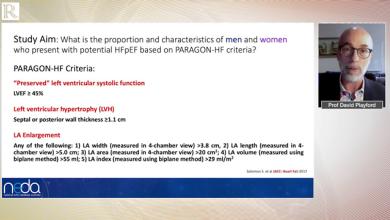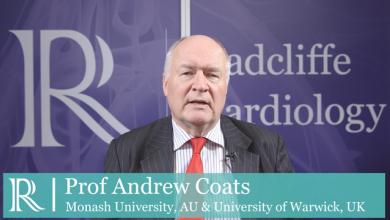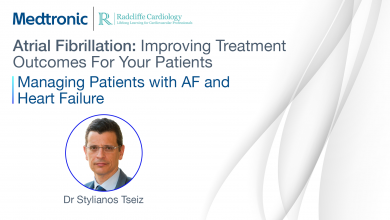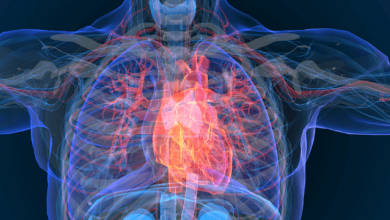Search results
Author(s):
David Playford
Added:
3 years ago
Prof David Playford (University of Notre Dame, Fremantle, WA, AU) discusses the lessons from the National Echocardiography Database of Australia (NEDA) in relation to preserved ejection fraction and structural heart disease in 446,848 patients.
Recorded remotely from Fremantle, 2020.
Questions:
1. What is the rationale of this study?
2. What were the aims of this study?
3. What were the…
View more
Author(s):
Gavino Casu
,
Pierluigi Merella
Added:
3 years ago
Heart failure (HF) is a syndrome defined by the failure of the heart to deliver oxygen at a rate commensurate with the requirements of the metabolising tissues, despite normal filling pressures (or only at the expense of increased filling pressures),1 secondary to an abnormality of the cardiac structure or function.
HF is the most common cause of hospitalisation in patients over the age of 65.2…
View more
Author(s):
Andrew JS Coats
Added:
4 years ago
Prof Andrew Coats (Monash University, AU & University of Warwick, UK) discusses the highlights of Heart Failure 2019.
Filmed on site at HFA 2019 by Radcliffe Cardiology.
Videography: Mike Knight & Tom Green
View more
Author(s):
Stylianos Tzeis
Added:
2 years ago
In this video Dr Stylianos Tzeis explains the ideal treatment pathway for patients with heart failure and Atrial Fibrillation to optimise patient outcomes.
Key Learning Objectives:
How can atrial fibrillation and heart failure intersect and what should you treat first?
The ideal patient pathway for patients with both AF and heart failure
AF treatment outcomes to expect for patients with…
View more
Author(s):
Cesare Rusconi
Added:
3 years ago
With the widespread availability of non-invasive bedside assessment of ventricular function by echocardiography in the last two decades the paradigm of heart failure (HF), presumed to be usually due to an impaired left ventricular (LV) systolic function, has been challenged by the finding that about half of patients suffering from HF syndrome exhibit a normal LV ejection fraction (LVEF), and the…
View more
THT 2024
Start date:
Mar 06, 2024
End date:
Mar 04, 2024
Event
Author(s):
Manuel J Antunes
Added:
3 years ago
After the advent of the heart–lung machine, which permitted open-heart surgery, in 1953, valve surgery was one of the most important advances in cardiac surgery. Initially, only conservative procedures were possible, but the first orthotopic human implantation of an artificial valve, by Starr in 1960, permitted the replacement of most cardiac valves not amenable to repair. Since then, more than a…
View more
Author(s):
Clare Taylor
,
Richard Hobbs
Added:
3 years ago
Heart failure is a complex clinical syndrome that results from a structural or functional cardiac abnormality. The prevalence of heart failure is likely to increase as the population ages and survival rates following myocardial infarction continue to improve.1 Morbidity and mortality rates are significant and relate to high healthcare costs in terms of hospital admissions and long-term care.2…
View more
Author(s):
Marco Metra
,
Savina Nodari
,
Livio Dei Cas
Added:
3 years ago
Beta-blocker therapy remains one of the most fascinating issues in heart failure (HF) clinical practice. These agents, once absolutely contraindicated in patients with HF, have been shown to have the greatest beneficial effects on the patients' prognosis. They have radically changed the clinical course of HF, more than any other agent previously introduced, and are now the cornerstone of current…
View more
Author(s):
David D Daly Jr
,
Michael R Gold
Added:
3 years ago
Interventricular conduction delay is common in patients with systolic heart failure (HF) and has been associated with a poor prognosis amongst these patients.1 Abnormal ventricular depolarization results in prolonged ventricular activation time and increased myocardial tension thus increasing myocardial oxygen consumption and decreasing ventricular diastolic filling time. In addition,…
View more















 « First
« First